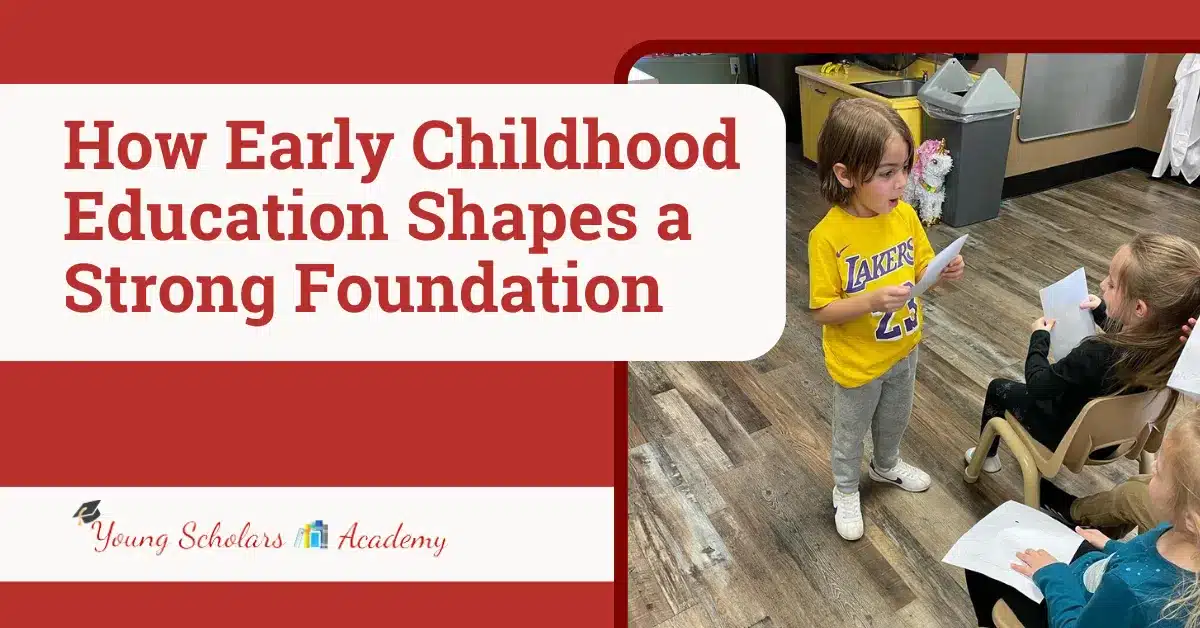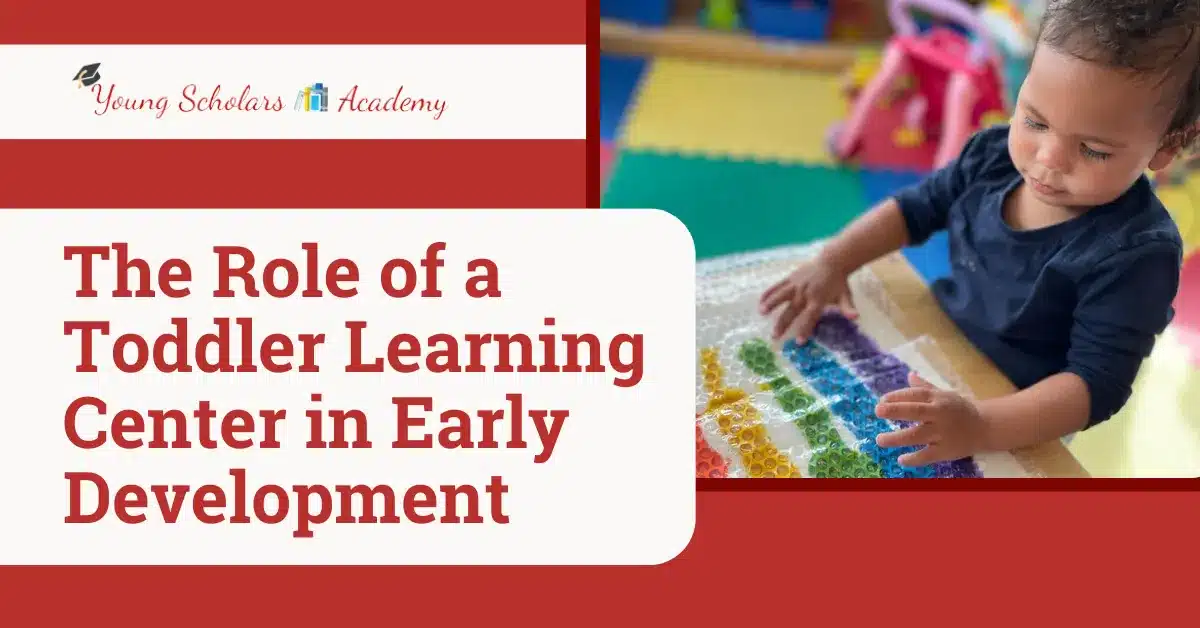Enrolling your child in a pre preschool program can be a transformative step in their early development. At this crucial stage, little learners thrive in an environment designed to spark curiosity, encourage social connections, and build foundational skills that set them up for lifelong success.
A high-quality pre-preschool program offers more than just structured play—it nurtures emotional growth, enhances communication abilities, and fosters a love for learning in a safe, supportive setting. With hands-on activities, compassionate teachers, and an emphasis on discovery, these programs help your child develop essential skills while making joyful memories.
How Early Childhood Education Shapes a Strong Foundation
The early years of a child’s life are filled with discovery, curiosity, and rapid development. Early childhood education significantly shapes their cognitive, social, and emotional skills, providing the building blocks for future learning. By engaging in structured play and hands-on experiences, children develop essential abilities that set them up for long-term success.
Cognitive Growth: Stimulating Learning Through Play
A child’s brain develops at an unbelievable rate during their early years, making this the perfect time to introduce engaging activities that strengthen problem-solving and critical-thinking skills. Learning through play helps young minds absorb information while having fun.
- Encouraging problem-solving: Simple puzzles and building blocks challenge children to think critically and develop solutions.
- Boosting memory retention: Songs, rhymes, and interactive storytelling enhance recall and language development.
- Introducing early math and literacy: Recognizing numbers, shapes, and letters lays the groundwork for future academic success.
When children engage in structured activities, they absorb new concepts and learn how to apply them in different scenarios, setting a solid foundation for continued education.
Social-Emotional Development: Learning to Connect with Others
Building strong social-emotional skills at an early age helps children develop empathy, communication abilities, and emotional resilience. They learn to interact with peers, express their feelings, and build meaningful relationships in a nurturing environment.
- Practicing teamwork: Group activities and cooperative games teach children to share, take turns, and collaborate.
- Expressing emotions: Storytime and role-playing help children identify and communicate their feelings healthily.
- Building self-confidence: Positive reinforcement and encouragement from teachers create a safe space for self-expression.
Children develop social awareness and emotional intelligence by participating in daily interactions and guided play, which is essential for lifelong success.
Hands-On Learning: Encouraging Creativity and Exploration
Young children thrive in environments that encourage creativity and hands-on learning. Engaging their senses through play lets them explore, experiment, and understand the world around them.
- Creating through art: Painting, drawing, and crafting help children express their imagination while improving fine motor skills.
- Exploring through movement: Dance, music, and outdoor activities enhance coordination and physical development.
- Engaging the senses: Sensory bins, water play, and textured materials stimulate cognitive and sensory processing.
Providing children with interactive learning experiences fosters curiosity and excitement, helping them develop a natural love for discovery and problem-solving.
Independence and Self-Help Skills: Preparing for the Next Steps
A high-quality early childhood education program focuses on more than academics—it also teaches children essential life skills that promote independence and responsibility.
- Following daily routines: Structured schedules teach children responsibility and time management.
- Practicing self-care: Simple tasks like washing hands and putting away toys encourage independence.
- Making choices: Guided decision-making helps children gain confidence in their abilities.
By mastering these fundamental skills in a supportive environment, children become more self-reliant and prepared for the following stages of learning.
The Role of a Toddler Learning Center in Early Development
The toddler years are a time of extreme growth and discovery. During this stage, children develop independence, improve communication skills, and explore the world around them. A toddler learning center is crucial in guiding this development by providing a structured yet nurturing environment where children can thrive. Through engaging activities and supportive educators, toddlers build the skills they need for future success.
Structured Routines: Creating a Sense of Security
Consistency and predictability help toddlers feel safe and confident in their surroundings. A well-designed toddler learning center follows structured routines that create a comforting environment while encouraging independence.
- Morning greetings: Welcoming routines help toddlers transition smoothly into their day.
- Circle time activities: Group discussions, songs, and interactive storytelling build social and listening skills.
- Meal and nap schedules: Consistent eating and resting times support physical and emotional well-being.
By following predictable routines, toddlers gain a sense of stability, making it easier for them to adapt to new experiences and develop self-regulation skills.
Language and Communication: Strengthening Expression
Toddlers are in the early stages of developing language, and a learning center provides the perfect setting for expanding their vocabulary and improving communication. Children build confidence to express themselves through conversation, music, and storytelling.
- Daily conversations: Teachers engage toddlers in discussions that encourage verbal expression.
- Interactive songs and rhymes: Music-based learning helps reinforce words, sounds, and sentence structure.
- Storytelling sessions: Books and puppets make language learning fun while improving comprehension.
When rich language experiences surround children, they develop stronger communication skills essential for academic and social success.
Motor Skill Development: Enhancing Coordination and Strength
Physical activity is a major component of early childhood learning, helping toddlers refine both fine and gross motor skills. Through hands-on activities and movement-based play, children strengthen their coordination and confidence.
- Building with blocks: Small movements, such as stacking and sorting, improve hand-eye coordination.
- Outdoor play and movement games: Running, climbing, and jumping promote physical strength and balance.
- Art and sensory play: Painting, drawing, and using playdough help toddlers develop fine motor control.
By engaging in movement-based activities, toddlers enhance their ability to perform everyday tasks, from grasping a crayon to climbing stairs with confidence.
Social Development: Learning to Connect and Cooperate
Social interactions in a toddler learning center allow children to practice critical relationship-building skills. They learn how to share, take turns, and express emotions in a supportive setting.
- Group playtime: Encourages cooperation and teamwork among peers.
- Guided problem-solving: Teachers help toddlers navigate conflicts and express feelings constructively.
- Positive reinforcement: Praise and encouragement build confidence in social interactions.
With proper guidance, toddlers develop friendships, learn empathy, and understand how to engage with others respectfully and meaningfully.
Encouraging Exploration and Creativity
Toddlers are naturally curious, and a learning center fosters their creativity through hands-on exploration. Children gain confidence in their abilities by providing open-ended activities and opportunities for self-expression.
- Sensory experiences: Sand, water, and textured materials engage the senses and stimulate curiosity.
- Music and movement: Dancing and playing instruments encourage creativity and self-expression.
- Pretend play and role-playing: Dress-up and storytelling nurture imagination and problem-solving skills.
Encouraging toddlers to explore their interests through creative play helps them develop a love for learning and a strong sense of self.
Pre-Kindergarten Readiness: Setting the Stage for Future Success
As children approach pre-kindergarten, they develop the essential skills and techniques to prepare them for a structured learning environment. Pre-kindergarten readiness focuses on building confidence, independence, and foundational academic skills, ensuring that children transition smoothly into formal education. A well-rounded pre-preschool program supports this development through engaging activities, nurturing guidance, and a balance of structured learning and play.
Early Literacy and Numeracy: Building Academic Foundations
Introducing pre-kindergarteners to letters, numbers, and basic problem-solving skills helps them gain familiarity with academic concepts. By engaging in hands-on learning experiences, children develop the confidence to explore new ideas.
- Letter recognition: Exposure to alphabet songs, flashcards, and storytelling strengthens early literacy skills.
- Counting and number concepts: Engaging activities, such as counting objects or sorting shapes, introduce basic math skills.
- Fine motor development: Tracing letters, using scissors, and practicing pencil grip prepare children for writing.
Through playful learning experiences, children build a strong academic foundation while developing a love for discovery and exploration.
Independence and Self-Regulation: Encouraging Responsibility
As children prepare for pre-kindergarten, fostering independence helps them feel confident in their abilities. Developing self-help skills allows them to navigate daily routines with ease.
- Following simple instructions: Activities that involve multi-step directions help children practice listening and problem-solving.
- Personal responsibility: Encouraging children to tidy up, put on their shoes, and wash their hands fosters self-sufficiency.
- Managing emotions: Guided activities teach children how to express feelings healthily and constructively.
By mastering these essential skills, children enter pre-kindergarten with a sense of confidence, independence, and readiness to engage in a classroom setting.
Social and Emotional Growth: Learning to Connect with Others
Interacting with peers and teachers in a developed setting helps children gain the social skills necessary for pre-kindergarten. A strong focus on communication, cooperation, and empathy prepares children for collaborative learning.
- Practicing turn-taking and sharing: Group activities reinforce cooperation and patience.
- Building friendships: Play-based interactions encourage relationship-building and teamwork.
- Recognizing emotions in others: Storytelling and role-playing help children develop empathy and understanding.
A supportive learning environment ensures that children feel comfortable expressing themselves while learning how to interact with others respectfully and meaningfully.
Physical and Cognitive Development: Preparing for an Active Learning Environment
Children in pre-kindergarten need opportunities to strengthen both their physical coordination and problem-solving skills. Engaging in movement-based activities and hands-on exploration prepares them for structured learning.
- Gross motor activities: Running, jumping, and balancing exercises improve coordination and strength.
- Fine motor practice: Cutting, coloring, and threading beads refine hand-eye coordination.
- Critical thinking challenges: Simple puzzles, sorting games, and cause-and-effect activities encourage problem-solving.
Providing children with diverse learning experiences ensures they develop the skills needed to succeed in pre-kindergarten. With a focus on academic, social, and physical growth, pre-kindergarten readiness equips children with the tools they need to take the next step in their educational journey confidently.
Conclusion
Enrolling your child in a pre-preschool program is one of the best investments you can make in the future. These early years lay the foundation for constant learning, fostering curiosity, confidence, and essential social skills. A high-quality program provides a nurturing environment where children can explore, grow, and form a love for learning through activities and play-based experiences. From early literacy and numeracy to hands-on exploration and social-emotional development, we focus on preparing little learners for a bright future.
Are you ready to give your child the perfect head start? Schedule a tour today and discover how our pre-preschool program can help your little one thrive! Call us at (719) 522-9099 or visit us at the Young Scholars Academy Contact Page to learn more. We can’t wait to meet you and your little scholar!


Leave a Reply